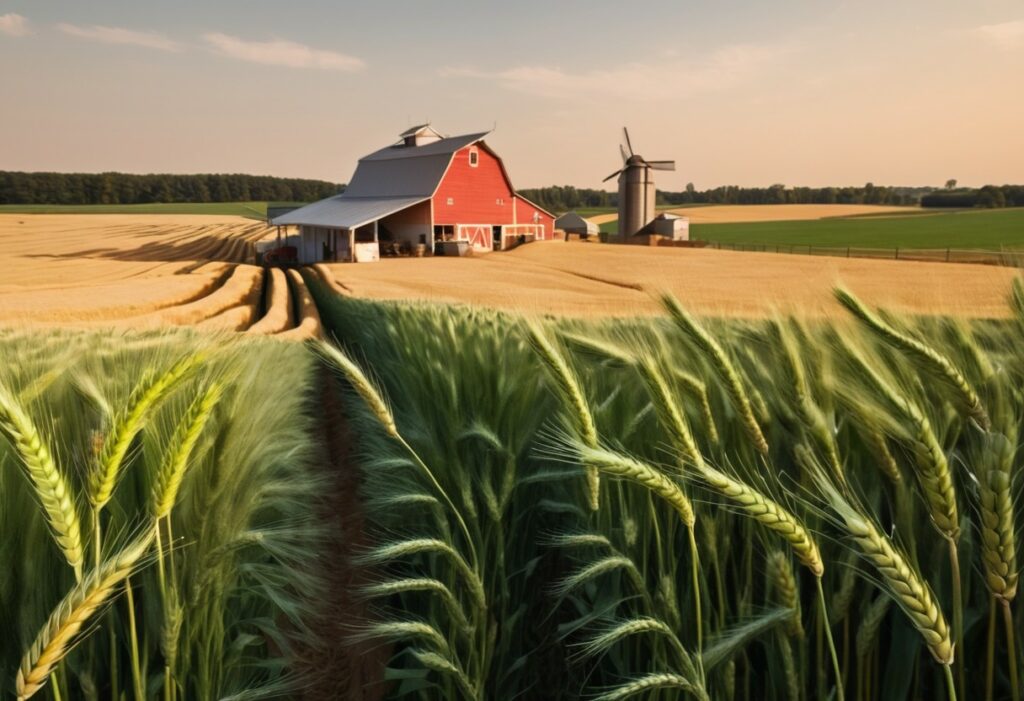As the world grapples with the complex challenges of food insecurity, environmental degradation, and socio-economic disparities, the urgency to build a fair and resilient food system has never been greater. A fair and resilient food system not only ensures equitable access to nutritious food for all but also fosters sustainability, protects biodiversity, and empowers local communities. In this article, we delve into the multifaceted dimensions of building such a system, exploring strategies to promote sustainability, equity, and resilience in our food production, distribution, and consumption practices.
Sustainability in Agriculture:
Sustainable agriculture is the cornerstone of a fair and resilient food system, embodying principles of environmental stewardship, social responsibility, and economic viability. At its core, sustainable agricultural practices prioritize harmony with nature, seeking to enhance soil health, conserve water, and minimize chemical inputs. One of the key tenets of sustainable agriculture is agroecology, which emphasizes working with ecosystems rather than against them.
Practices such as organic farming, agroforestry, and regenerative agriculture exemplify this approach, integrating ecological principles into agricultural production systems. Organic farming eschews synthetic pesticides and fertilizers in favor of natural alternatives, promoting soil fertility and biodiversity. Agroforestry combines tree cultivation with crops or livestock, harnessing the benefits of trees for soil conservation, carbon sequestration, and biodiversity enhancement. Regenerative agriculture goes a step further, focusing on restoring degraded land and building soil health through techniques such as cover cropping, rotational grazing, and minimal tillage.
These sustainable agricultural practices not only mitigate environmental degradation but also contribute to climate change mitigation and adaptation. By promoting biodiversity, sequestering carbon in soils and biomass, and enhancing ecosystem resilience, sustainable agriculture lays the foundation for a resilient food system capable of withstanding future challenges, such as climate variability and extreme weather events. Embracing sustainability in agriculture is essential for safeguarding the health of ecosystems, communities, and future generations, ensuring a fair and resilient food system for all.
Equitable Access to Food:
In a fair food system, every individual, regardless of socio-economic status or geographical location, should have access to safe, nutritious, and culturally appropriate food. Achieving this goal requires addressing the structural inequalities and systemic barriers that perpetuate food insecurity and malnutrition worldwide.
Community-driven initiatives such as community gardens, farmers’ markets, and food cooperatives play a crucial role in promoting equitable access to food. These initiatives empower local communities to produce and access fresh, healthy food while simultaneously supporting local economies and reducing food miles. By cultivating food locally and directly engaging with producers, consumers can strengthen local food systems and foster a sense of community ownership over food production and distribution.
Furthermore, policies that promote food sovereignty, land rights, and social protection programs are essential for ensuring equitable access to food for vulnerable populations. Food sovereignty initiatives prioritize local food production and distribution systems, empowering communities to control their own food systems and determine their own food policies. Similarly, securing land rights for small-scale farmers and indigenous communities ensures their ability to produce food sustainably and maintain their livelihoods.
Social protection programs, such as food assistance programs and income support schemes, are critical for addressing immediate food needs and protecting vulnerable populations from hunger and malnutrition. By providing access to food and income support, these programs help to alleviate poverty and food insecurity, ensuring that no one is left behind in the pursuit of food security and nutrition.
Equitable access to food is a fundamental human right and a cornerstone of a fair and resilient food system. By addressing structural inequalities, promoting community-driven initiatives, and implementing supportive policies, we can create a world where everyone has access to the food they need to lead healthy and fulfilling lives.
Resilient Supply Chains:
In today’s interconnected world, building resilience in food supply chains is crucial for mitigating the impacts of various shocks and disruptions, including pandemics, extreme weather events, and economic crises. A resilient food supply chain is one that can adapt and respond effectively to unforeseen challenges, ensuring the continued availability of food to consumers.
One key strategy for enhancing resilience in food supply chains is diversification. By diversifying sources of supply and distribution channels, food businesses can reduce their vulnerability to disruptions in any single area. Promoting local food production and supporting small-scale farmers and producers can also contribute to resilience by reducing reliance on long-distance transportation and import dependencies.
Investing in infrastructure for storage and distribution is another critical aspect of building resilient supply chains. Adequate storage facilities, cold chain infrastructure, and transportation networks are essential for maintaining the integrity and quality of food products, particularly during periods of disruption.
Furthermore, embracing digital technologies can significantly enhance the resilience of food supply chains. Technologies such as blockchain and predictive analytics enable greater transparency, traceability, and efficiency in supply chain management. By providing real-time visibility into the movement of food products from farm to fork, these technologies can help identify and address potential disruptions more quickly, reducing waste and ensuring food safety and security.
Building resilience in food supply chains is essential for ensuring the stability and security of our food systems. By diversifying supply chains, investing in infrastructure, and embracing digital technologies, we can create a more resilient food supply chain capable of withstanding and recovering from various challenges and disruptions.
Empowering Small-Scale Producers:
Small-scale farmers, fishers, and indigenous communities play a vital role in global food production, often operating on a subsistence level and facing numerous challenges. Despite their contributions, they frequently encounter marginalization, land grabbing, and exploitation, which undermine their livelihoods and food security. Empowering these small-scale producers is crucial for building a fair and resilient food system that prioritizes equity and sustainability.
One key aspect of empowering small-scale producers is ensuring access to essential resources such as land, credit, and markets. Secure land tenure rights enable farmers to invest in their land, adopt sustainable practices, and build resilience to external shocks. Access to credit and financial services allows small-scale producers to invest in their businesses, purchase inputs, and access markets. Moreover, facilitating market access through fair trade policies and market linkages ensures that small-scale producers receive fair prices for their products, enabling them to earn a decent income and improve their livelihoods.
Promoting agroecological farming practices is another critical strategy for empowering small-scale producers. Agroecology emphasizes working with nature to enhance soil fertility, conserve water, and promote biodiversity. By supporting agroecological approaches, policymakers and stakeholders can help small-scale producers adopt sustainable farming practices that improve soil health, increase resilience to climate change, and reduce reliance on costly inputs such as chemical fertilizers and pesticides.
Strengthening farmer cooperatives and producer organizations is also essential for empowering small-scale producers. By pooling resources, sharing knowledge, and collectively marketing their products, small-scale producers can negotiate better prices, access services, and advocate for their rights more effectively. Additionally, farmer cooperatives provide a platform for social solidarity, capacity building, and collective action, fostering a sense of community and mutual support among small-scale producers.
Empowering small-scale producers is essential for building a fair and resilient food system that prioritizes equity, sustainability, and social justice. By ensuring access to resources, promoting agroecological practices, and strengthening farmer cooperatives, we can support the livelihoods and resilience of small-scale producers while promoting biodiversity conservation and cultural diversity.
Education and Awareness:
Education and awareness are pivotal in fostering a transformative shift towards more sustainable and equitable food systems. Empowering consumers with knowledge about the environmental, social, and health impacts of their food choices can catalyze a demand for sustainable and ethically produced food. By understanding the implications of their consumption habits, consumers can make informed decisions that support fair trade practices, reduce food waste, and promote environmental conservation.
Similarly, integrating food systems education into school curricula can cultivate a generation of informed citizens who understand the interconnectedness of food, health, and the environment. By teaching students about topics such as agriculture, nutrition, and food justice, educators can instill values of sustainability, equity, and social responsibility from an early age.
Furthermore, celebrating local food cultures and promoting culinary traditions can foster a deeper connection to food and agriculture. By highlighting the diversity of food traditions and cuisines, communities can celebrate the cultural significance of food while also promoting local food systems and supporting small-scale producers.
Building a fair and resilient food system is a multifaceted endeavor that requires collaborative efforts from governments, civil society, businesses, and consumers. By promoting sustainability, equity, and resilience in our food production, distribution, and consumption practices, we can create a world where everyone has access to nutritious food, ecosystems thrive, and communities prosper. Embracing the principles of fairness and resilience in our food system is not just a moral imperative but a fundamental necessity for the well-being of people and the planet. Together, let us work towards a future where food systems are equitable, sustainable, and resilient, ensuring a legacy of health and prosperity for generations to come.










More Stories
Beyond the Plate: The Environmental, Economic, and Social Impact of Global Food Waste
Balancing Act: Aquaculture’s Impact on Biodiversity Conservation
Onions: Trends and Opportunities in the Global Market